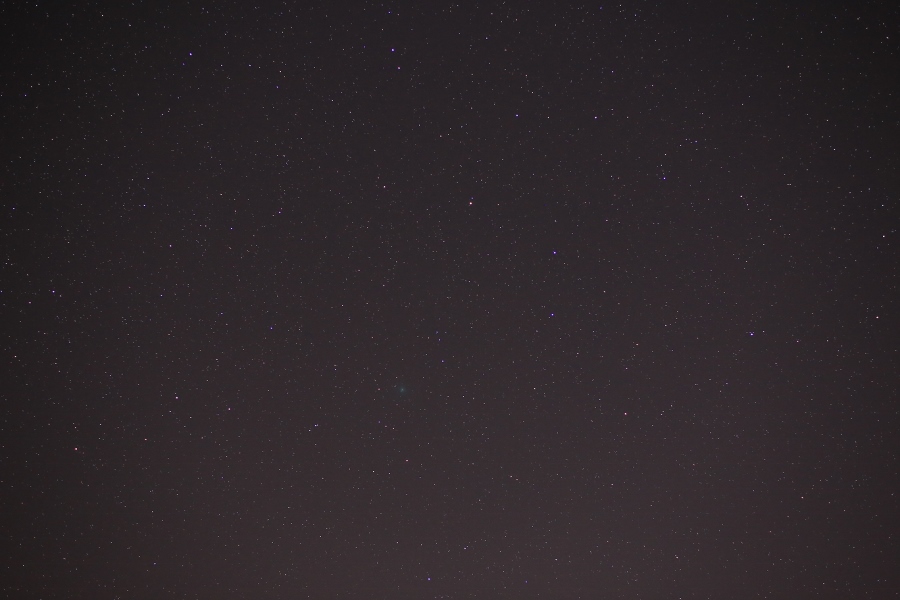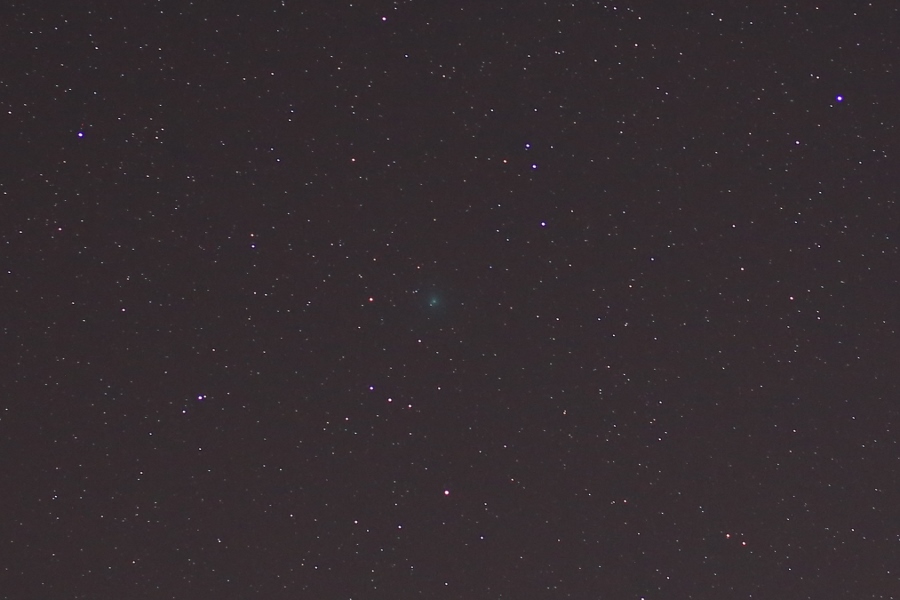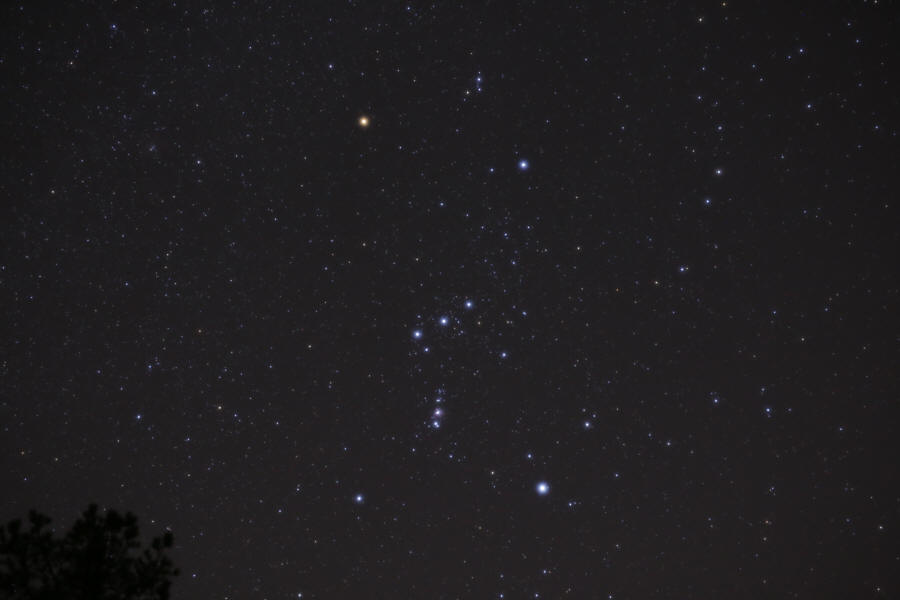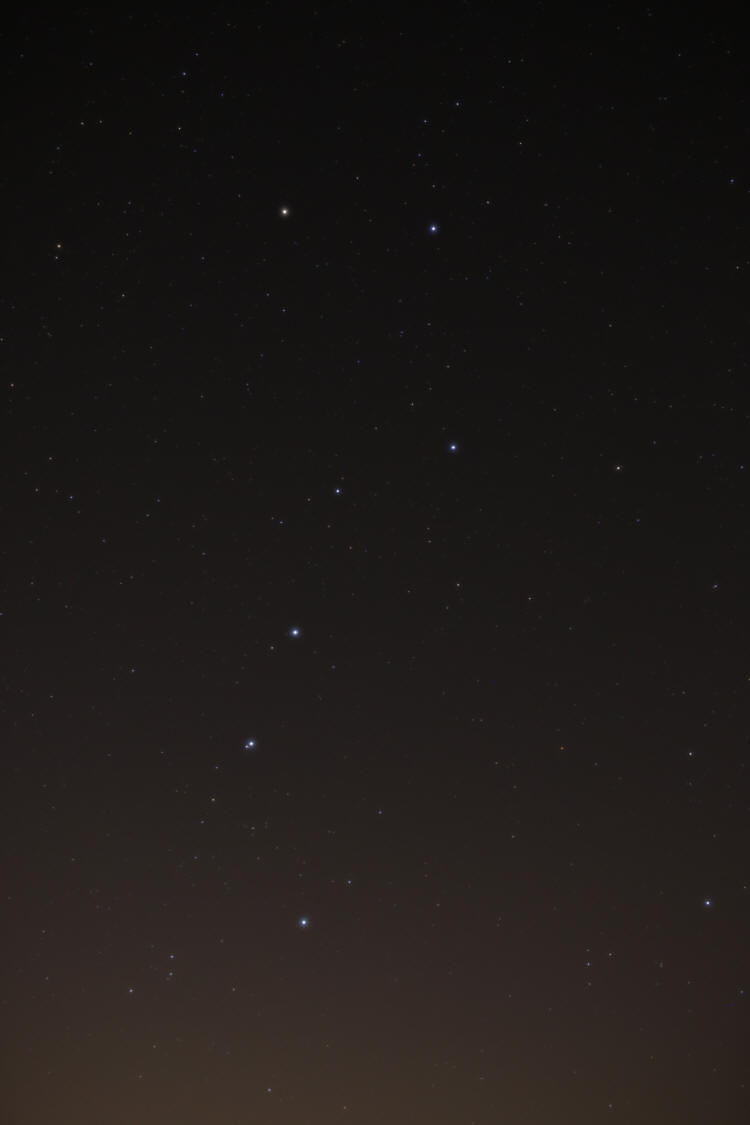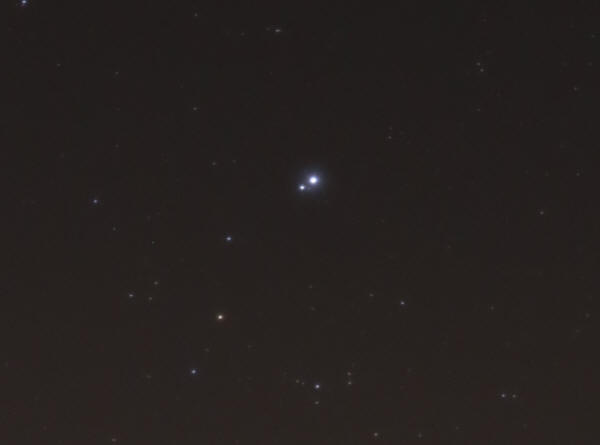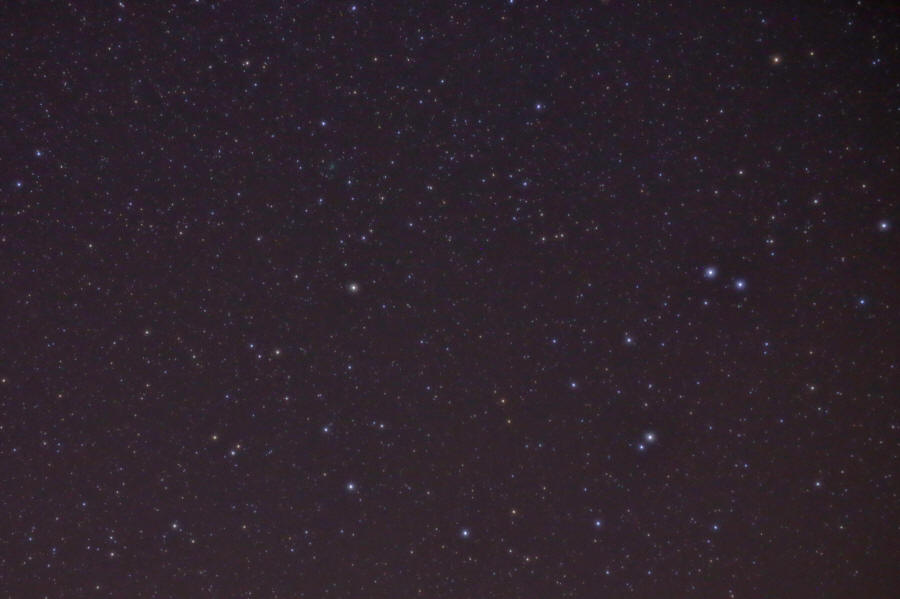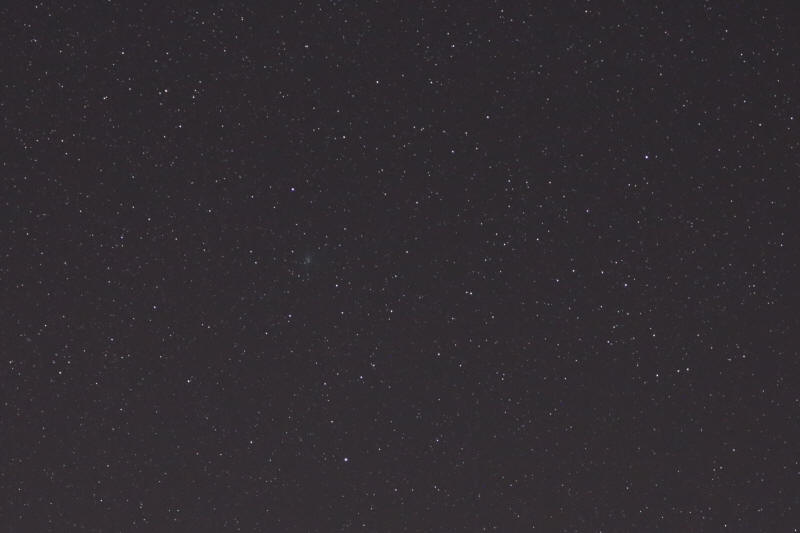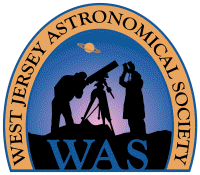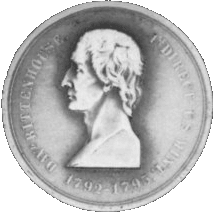SJAstro Page Index
The Constellation Orion
This is a view of the constellation Orion on
January 5, 2019, from
Wharton State Forest, NJ. Taken at 10:57 pm EST with a
Canon 6D digital SLR camera on a fixed tripod, and a Sigma 50 mm f/1.4
Art lens with a
Hoya "diffuser" filter.
It was exposed 4 seconds at
f/2.0, ISO 3200, 4400 K white balance. Besides size reduction for this
page, no adjustments were made. The field is 39° wide x 27° high. This
grab shot is mainly a test of a
diffusion filter to enhance the visibility and color of the stars. Mouseover for
labels.
Below is a picture of the
Big Dipper
in Ursa Major taken at 11:13 pm EST with the same equipment as above.
Exposed 4 seconds at f/2.0, ISO 1600 (one stop less than the Orion
shot), 4400 K white balance. Besides rotation and size reduction for
this page, no adjustments were made. Light pollution in the northeast
creeps in towards the bottom. Below this image is a 23% crop (8.9° wide
x 6.7° high field) of
the area around Mizar and Alcor, the double star at the middle of the
handle. Those two stars are easily visible in the original and the crop,
but in the crop, the star between them,
Sidus Ludoviciana (Ludwig's Star) is also visible. Almost a surprise
to see it with just a 50 mm focal length plus a diffusion filter.
At center, Alcor (left), Mizar (right), and
between them, Sidus Ludoviciana (Ludwig's Star).
Comet 46P/Wirtanen
This is a view of comet
46P/Wirtanen
in Lynx on January 5, 2019,
from Wharton State Forest, NJ. Taken at 11:01 pm EST with a Canon 6D
digital SLR camera on a fixed tripod, and a Sigma 50 mm f/1.4 Art lens
with a Hoya "diffuser" filter.
It was exposed 6 seconds at f/2.0, ISO 3200, 4400 K white balance.
Besides slight cropping (83% of original linear dimensions) and size
reduction for this page, no adjustments were made. The field is 33° wide
x 22° high. Mouseover for
labels.
Here's my 46P
sighting log for 2018/2019.
The image below was taken at 11:04 pm with the same equipment and
settings, except there was no diffusion
filter. There were no adjustments
besides cropping to about 45% of the original linear size for a field
18° wide x 12° high. Mouseover for
labels.
Comet 46P/Wirtanen
This is a view of comet
46P/Wirtanen
in Auriga on December 27, 2018,
from Swede Run in Moorestown, NJ.
Taken at
4:17 am EST with a Canon 7D Mark II digital SLR camera
and a Canon 200 mm f/2.8L lens (on a fixed tripod). It was exposed 2.5
seconds at f/2.8, ISO 1600, 4200 K white balance. Besides cropping the
height to a 16:9 ratio, and size reduction, no adjustments were made.
The field is 6.4° wide x 3.6° high. Mouseover for
labels. At the time, the comet was at 43° altitude and 309°
azimuth, while the 72% illuminated moon was at 61° altitude and 176°
azimuth. The sky was hazy and 46P was barely visible in 15x56 binoculars.
Mercury and Jupiter
This
snapshot of the planets
Mercury
and
Jupiter
was captured on December 25, 2018,
at 6:15 am EST from Wharton State Forest, NJ, with a Canon
7D Mark II digital SLR camera (on a fixed tripod) and a Sigma
50 mm f/1.4 Art lens. Exposed 0.8 second at f/2.8, ISO 800, daylight
white balance. It was cropped to 66% of the width x 76% of the height yielding a field
17° wide x 13° high. At the time, magnitude -0.4 Mercury was at 3.9°
altitude and 4.2° east of magnitude -1.8 Jupiter, which was at 6.9°
altitude. Mouseover for
labels. Here's my 2018 Mercury
sighting page.
(1) Ceres near Venus
This
snapshot shows the asteroid
(1) Ceres (or minor
planet or dwarf planet), near the planet
Venus on December 25, 2018,
at 6:08 am EST. It was captured from in Wharton State
Forest, NJ, with a Canon 7D Mark II digital SLR camera (on a fixed tripod) and a Sigma
50 mm f/1.4 Art lens. Exposed 4 seconds at f/2.8, ISO 800, daylight
white balance. It was cropped to 38% of the width x 35% of the height yielding a field
9.8° wide x 6.0° high. At the time, magnitude 8.9 Ceres was 3.3° from
magnitude -4.5 Venus. The 13.4 magnitude difference is equivalent to
about a 229,000x difference in brightness (and hence the vastly
overexposed Venus). Mouseover for
labels.
Comet 46P/Wirtanen
This
wide-field snapshot of comet
46P/Wirtanen
was captured on December 11, 2018,
from Atsion in Wharton State Forest, NJ. It was taken at 8:56 pm
EST with a Canon 6D digital SLR camera (on a fixed tripod) and a Sigma
20 mm f/1.4 Art
lens. It was exposed 13 seconds at f/2.8, ISO 3200, 3800 K
white balance. Brightness and contrast were mildly adjusted, then
the vertical composition was cropped to an 8x10 ratio yielding a field
62° wide x 73° high. The comet was 53° altitude at the time. Mouseover for
labels.
46P was an easy target with my 15x56 binoculars, and I could glimpse it
with unaided eyes, but probably less conspicuous with
unaided eyes than it is in this picture. The comet had crossed the border from
the constellations Cetus into Taurus
about 2 pm on December 11 and will be
between the Hyades and the
Pleiades on the night of December 15 (but the first-quarter moon
doesn't set until half an hour after midnight). It will still be nearly
between the Haydes and Pleiades on the night of December 16, but moonset
is around 1:30 am. Perihelion is on
December 12 and perigee is on December 16.
This is a closer view of comet
46P/Wirtanen
near the Hyades and Pleiades star clusters from
Atsion on December 11, 2018.
Taken at
9:13 pm
EST with a Canon 6D digital SLR camera
(on a fixed tripod)
and a Canon 40 mm f/2.8 "pancake" lens. It was exposed 13 seconds at
f/4, ISO 6400, 3800 K white balance
(so the coma looks a bit bluer than it really is). Besides cropping
to about 70% of the original size, then size reduction, no adjustments
were made. The field is
35° wide x 24° high. Mouseover for
labels.
This
even closer view of comet
46P/Wirtanen
was also captured on December 11, 2018,
from Atsion. Taken at 8:18 pm
EST with a Canon 6D digital SLR camera and a Canon 200 mm f/2.8L
lens
(on a fixed tripod). It was exposed 4 seconds at f/2.8,
ISO 6400, 3800 K white balance (again, the coma is a bit too blue). Besides size reduction, no adjustments
were made. The field is 10.2° wide x 6.8° high. Mouseover for
labels.
The previous night (December 10, 2018, 11:59 pm), I spotted 46P
near Kappač Ceti
with 15x56 binoculars from my light-polluted, suburban front yard. While
not nearly as obvious as it was with the 15x56s at Atsion on December
11, it wasn't that hard to see. For reference, KappaČ and Kappač Ceti
are 32 arc minutes apart, magnitude 5.7 and 5.0 respectively. Xi and
Omicron Tauri are 55 arc minutes apart and magnitude 3.8 and 3.6
respectively. On the evening of December 11, 46P was moving at a rate of
3.7°/day against the background stars, or 9.3"/minute (so motion could
be detected in a fairly short period of time).
Comet 46P/Wirtanen
This
wider-field snapshot of comet
46P/Wirtanen
was captured on December 7, 2018,
from Wharton State Forest, NJ. It was taken at 10:58 pm
EST with a Canon 6D digital SLR camera (on a fixed tripod) and a Tamron
45 mm f/1.8
lens. It was exposed 6 seconds at f/2.2, ISO 3200, 4500 K
white balance. Except for size reduction, it's straight from the camera
(unprocessed and uncropped). The field is 43° wide x 30° high. Mouseover for
labels.
At the time, the comet was about 42° altitude and
201° azimuth in the constellation
Eridanus. Magnitude estimates were running around 5 at the time, but
it was just barely visible with unaided eyes, probably due to the large
coma which yields low surface brightness. However, it was easily visible
in 15x56 binoculars.
The image below is a 37% crop of the original
previous image, yielding a field 17° wide x 11° high; it shows the comet
and surrounding stars better. Other than cropping and size reduction, no
processing was applied. Mouseover for labels.
Click here
for the previous page.
Click here
for an index to previous SJAstro pages.
January 5, 2019
January 5, 2019
December 27, 2018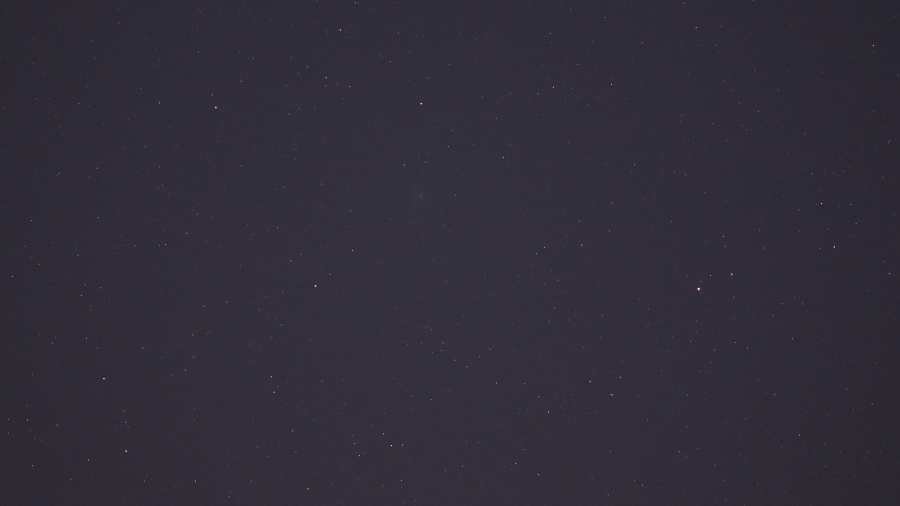
December 25, 2018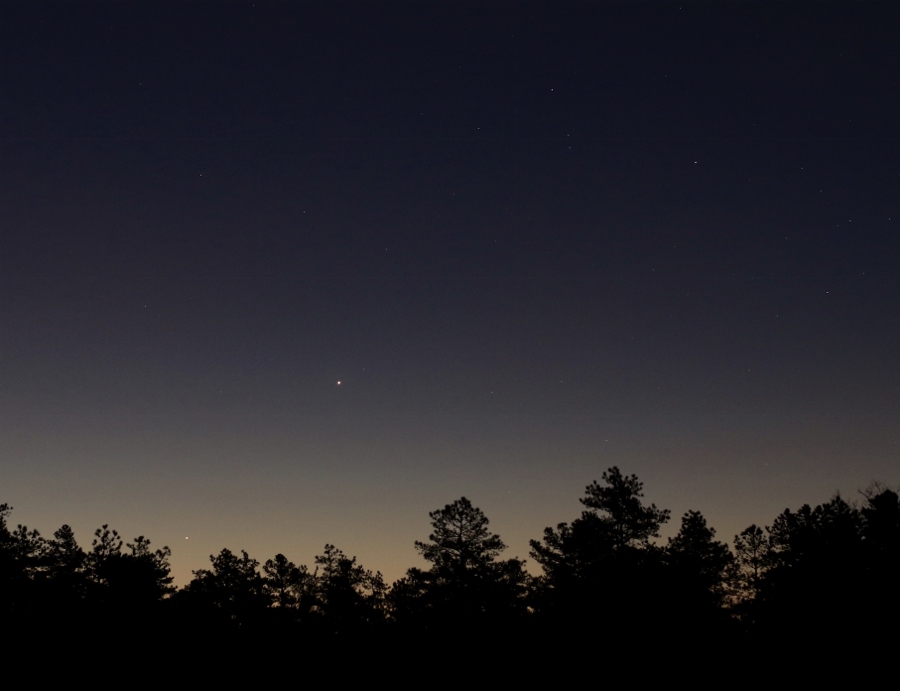
December 25, 2018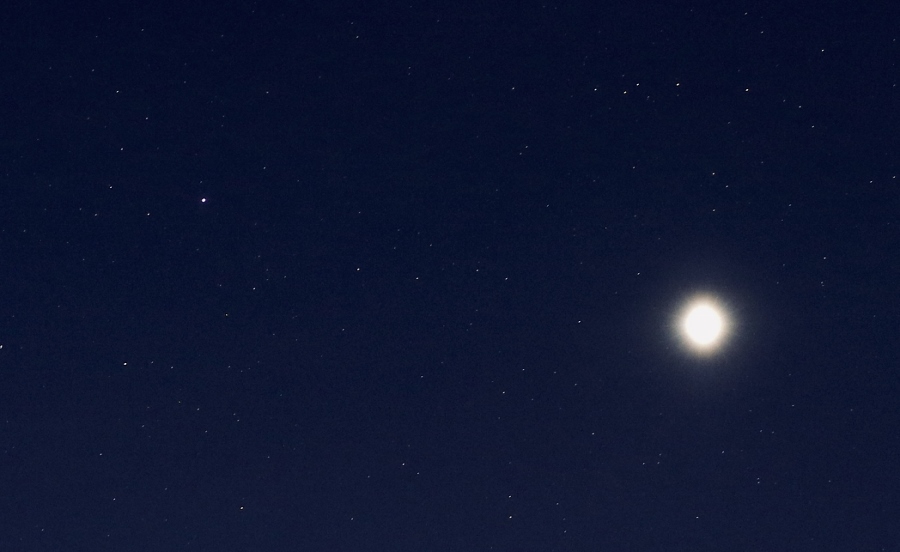
December 11, 2018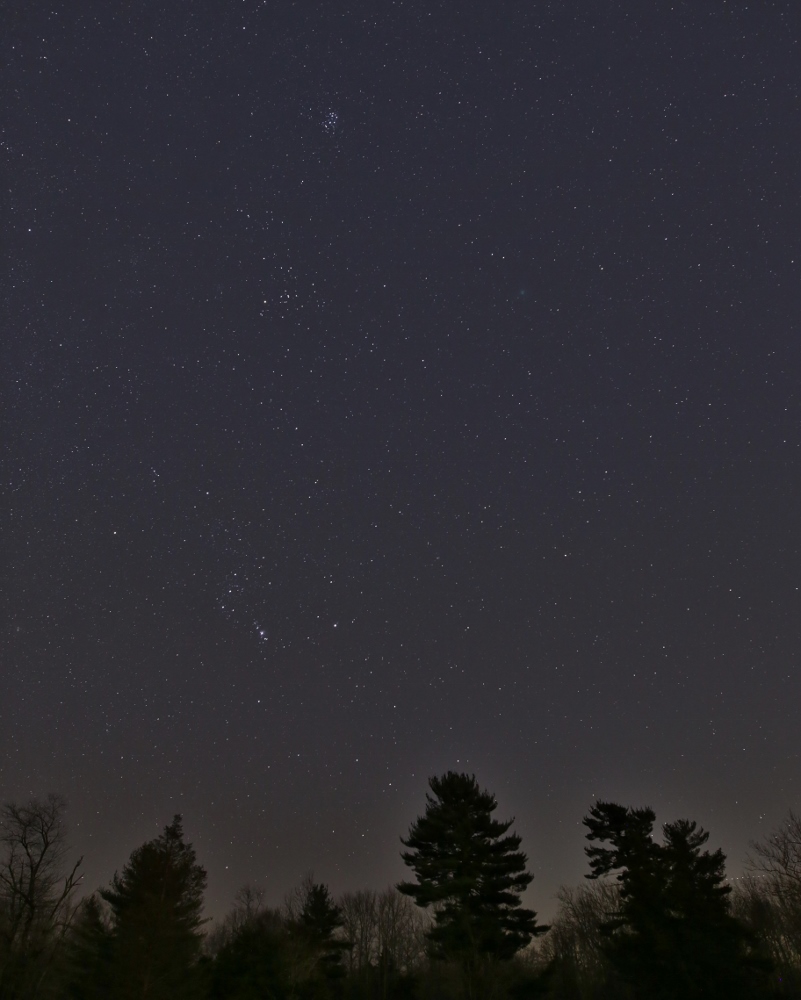
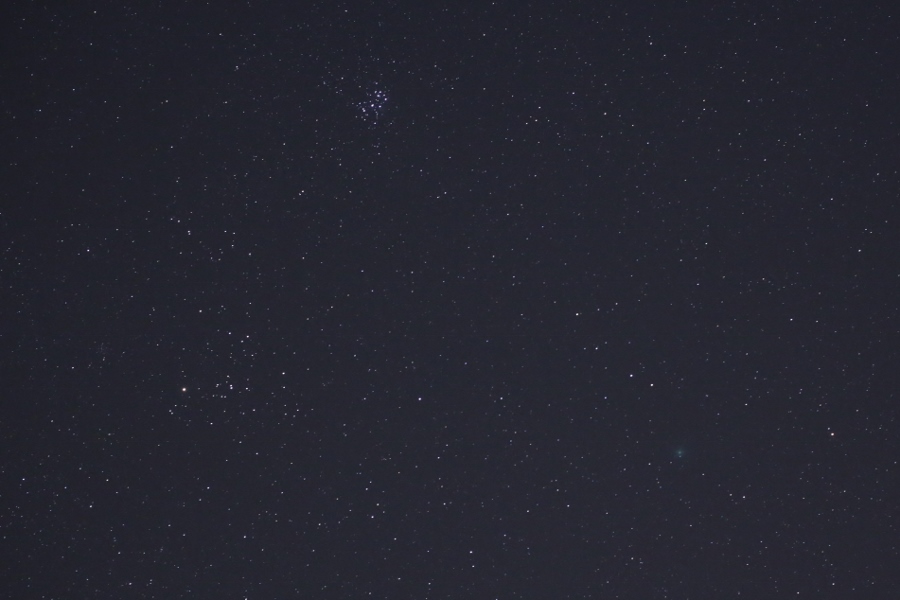
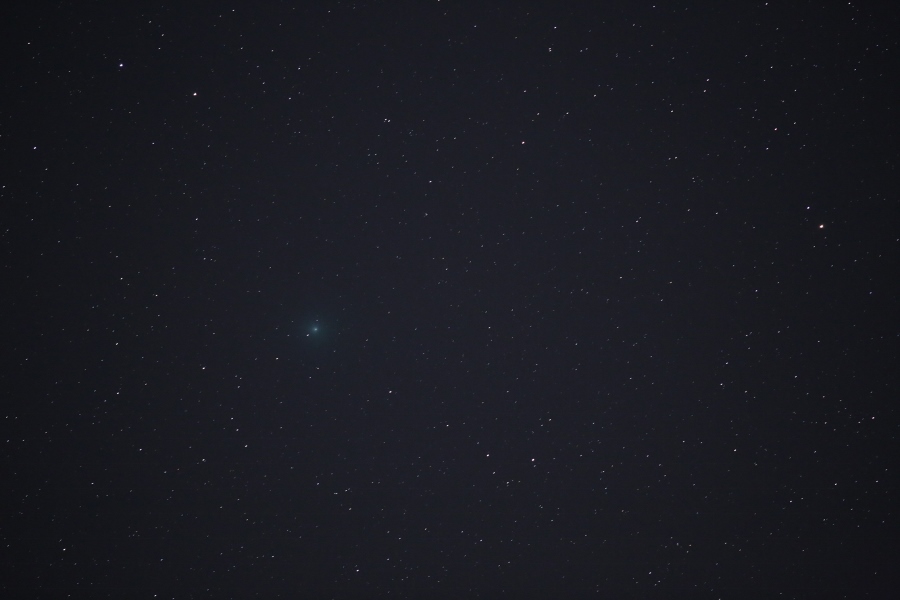
December 7, 2018